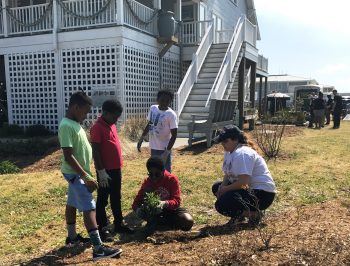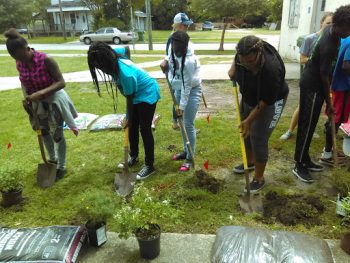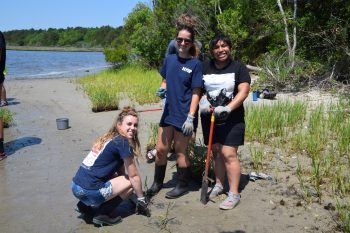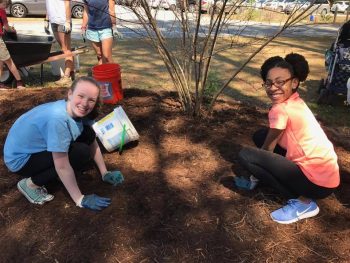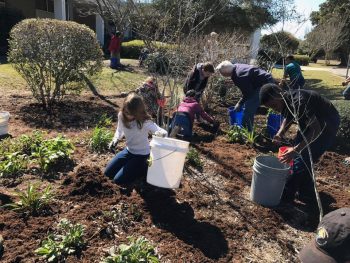For the last year, the North Carolina Coastal Federation has been able to increase its capacity to engage more students from underserved communities in coastal stewardship through service learning because of a grant from the State Farm Youth Advisory Board.
The 12-month, $38,000 grant, which wrapped up in November, enabled the federation to increase its programs with the Wilmington-based Blue Ribbon Commission on the Prevention of Youth Violence (BRC), as well as with area schools. The grant helped the federation develop and implement the “Students Restoring Coastal Creeks and Habitats” student service learning program for the Cape Fear region.
Staff members worked with students ranging in age from first-grade to 12th-grade. The education program directly engaged 449 students in service learning activities and an additional 1,532 students in the coastal education program. Eighty percent of those students came from Title I schools and low income, underserved communities.
The education program incorporated environmentally-based service learning into academic curriculum and community development programs, and to provide the knowledge, skills and experience for students to be active environmental stewards.
Working with BRC, the federation helped develop environmental education programs for students living in an area of Wilmington that BRC calls the “Youth Enrichment Zone” (YEZ). The YEZ has historically high crime rates, and BRC strives to provide education and employment opportunities for students living in the area.
The federation’s first field trip funded by the grant was with students from BRC’s Voyage program, an afterschool program for YEZ students in grades second through sixth.
Throughout the year, federation staff members continued to expand on these lessons with students. Ted Wilgis, coastal education coordinator at the Wrightsville Beach office, and Jessica Gray, coastal outreach associate, spent the most time with these students, as did AmeriCorps members Kate Conery and Nina Quaratella.
The students learned about stormwater runoff, marine debris and local marine life. They played games like BMP (best management practices tag) and pretended to be stormwater engineers to learn about how reducing the volume of stormwater runoff improves water quality. They also went on the Walk the Loop tour around the John Nesbitt Loop near the Wrightsville Beach office.
Conery said that over the course of the lessons, she saw students who were once too shy to come up to the front of the room or raise their hands were eager to share what they were learning and doing by their final lessons.
At a lesson on marine debris, students designed their own comic strips about the effects of litter.
“They each created a story behind the impact that a piece of marine debris had on a shark, whale or other marine organism,” she said.
During her final lesson with the students, they went through photos that were taken throughout the course of their lessons.
“Seeing the pictures really jogged the students’ memories so they were able to not only explain the individual activities we did but also explain most of the take home messages as well,” Conery said.
Thanks to the grant, the federation was also able to serve as a host site for the BRC’s Summer Employment program for high school students. Chakala Hill, a junior at New Hanover High School, helped with the weekly Touch Tank Tuesday programs and with restoration work over the summer.
Check out some more specific stats and programs, as well as some photos from the different projects and lessons:
Throughout the year, the staff in the Wrightsville Beach office:
- Worked with the Blue Ribbon Commission on the Prevention of Youth Violence to:
- Engage rising ninth-graders from the Youth Enrichment Zone in the BRC Summer Bridge Program Burnt Mill Creek Steward Program, including: water quality monitoring, stormwater education and a service learning stormwater reduction project
- Provide coastal habitat and water quality classroom and field education for their afterschool program participants
- Serve as a host site for their summer job placement program and sponsor a rising junior student from New Hanover High School in its education program
- Engaged students from Ashley High School, Hoggard High School and New Hanover High School in oyster reef and salt marsh habitat restoration service learning activities and projects
- Partnered with students and teachers from Bradley Creek Elementary School and Alderman Elementary School to maintain the rain gardens at their schools and use the stormwater reduction projects as living classrooms
- Engaged students in classroom lessons at their schools with hands-on, interactive activities on stormwater pollution, water quality, oyster ecology and coastal habitats
- Conducted student evaluations which indicate significant gains in understanding and appreciation of coastal habitats and water quality, and the development of problem solving skills

